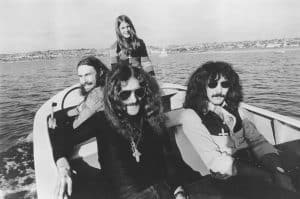When Dave Walker Stepped In for Ozzy — The Overlooked Sabbath Story

via DoomMetalSludge / youtube
Black Sabbath are rightly hailed as one of the founding pillars of heavy metal. The original lineup—Ozzy Osbourne on vocals, Tony Iommi on guitar, Geezer Butler on bass, and Bill Ward on drums—produced a string of classic albums from their 1970 self-titled debut through 1975’s Sabotage. These records defined heavy metal for generations.
But by 1976, cracks began to appear. After releasing Technical Ecstasy, the band faced mounting pressures: they were recovering from a costly legal battle with their former manager, taxes were piling up, and the toll of relentless touring and substance abuse was catching up with them. Record sales were slipping, and creative tension was rife.
“I’d had enough,” Ozzy recalled in his 2009 autobiography, I Am Ozzy. “There didn’t seem to be any point any more. None of us was getting on. We were spending more time in meetings with lawyers than we were writing songs; we were all exhausted from touring the world pretty much non-stop for six years; and we were out of our minds on booze and drugs.”
In late 1977, the inevitable happened. “One day, I just walked out of a rehearsal and didn’t come back,” he said, describing his abrupt exit from the band he had co-founded nearly a decade earlier.
Enter Dave Walker: A Temporary Frontman
Replacing a vocalist as charismatic and distinctive as Ozzy Osbourne was no easy task. Rather than embark on a drawn-out audition process, Black Sabbath turned to someone familiar: Dave Walker.
Walker, from Walsall near Birmingham, had a storied early career. He played with The Redcaps, The Idle Race, and Savoy Brown, and even briefly joined Fleetwood Mac, appearing on two tracks of 1973’s largely forgotten Penguin album. By 1977, however, Walker’s career momentum was slowing. He was in California with a band called Mistress, which was on the verge of collapse, when Sabbath’s road manager called.
“I got a call from Sabbath’s road manager, and I flew over to start rehearsals at an old mill near Rockfield Studios in Monmouth,” Walker told Classic Rock in 2014.
The band had already started writing material for the follow-up to Technical Ecstasy, which they played for Walker. “Right away they let me hear the tracks they’d been working on and told me they needed lyrics,” he said. “There wasn’t what I’d call one complete song, just reels of tape with little ideas on them. I wrote a shitload of lyrics, but I had no idea that Geezer was their main lyricist.”
Despite the challenges, Sabbath initially appeared invested in the experiment. On January 6, 1978, Walker and the band performed on the Birmingham TV show Look! Hear!, delivering the intro to “War Pigs” and a new song called “Junior’s Eyes.” The performance was thought lost for decades, only resurfacing on YouTube in November 2025.
Walker even had a chance to meet Ozzy during his brief tenure. “Ozzy came to meet us one day in a pub,” he recalled. “I felt really sad for him, because he was literally shaking. I’ve been around the block with drugs but when I saw poor Ozzy I thought, ‘God almighty.’ There was no suggestion that he might come back, but I had the feeling he was having second thoughts.”
A Brief, Uneasy Chapter
Walker’s time with Black Sabbath was short-lived. “I knew things weren’t going well musically, and it was made worse by the fact that my wife and Bill Ward’s wife clashed,” he said. His dismissal came abruptly. “One day I turned up where they were rehearsing near Evesham and they were having a meeting, after which Bill told me, ‘We’re in, you’re out,’” he remembered. “No warning. I still don’t even know if Ozzy had agreed to come back then.”
When Never Say Die! was released in September 1978, Ozzy was back on vocals, and “Junior’s Eyes” appeared with reworked lyrics. Despite his return, the band was struggling creatively, and Ozzy’s substance abuse issues would eventually lead to his second firing in April 1979, after which Ronnie James Dio took over on vocals for the acclaimed Heaven and Hell.
Walker continued his musical journey with his own band and later reunited with Savoy Brown. Reflecting on his brief stint with Sabbath, he remained pragmatic. “I knew that on the artistic side we really weren’t compatible,” he said. “It was kind of cool, but there was a lot left to be desired.”
Today, Walker’s time in Black Sabbath is more than a footnote. It represents a fleeting, fragile moment in the band’s history—a glimpse of what might have been during a period of turmoil and reinvention. The resurfaced footage, the rare interviews, and the stories shared decades later serve as a reminder that even the heaviest of metal icons had moments of uncertainty, experimentation, and human fragility.













